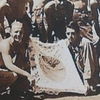|
Replies: 5
| visibility 215
|
110%er [3646]
TigerPulse: 80%
35
|
Why would a loving god require animal sacrifice?

2
Sep 22, 2023, 10:39 AM
|
|
Oh you love me? Prove it by killing your animals.

|
|
|
|
 |
Tiger Titan [48991]
TigerPulse: 100%
58
Posts: 45324
Joined: 2002
|
is that you, Marcion of Sinope?***

2
Sep 22, 2023, 10:41 AM
|
|
|
|
|
|
|
 |
Orange Blooded [3230]
TigerPulse: 100%
34
|
Re: Why would a loving god require animal sacrifice?

2
Sep 22, 2023, 10:46 AM
|
|
He is loving, but very insecure.
|
|
|
|
|
 |
Top TigerNet [30785]
TigerPulse: 100%
55
Posts: 23216
Joined: 2002
|
Scalp the Noles !***

1
Sep 22, 2023, 10:52 AM
|
|
|
|
|
|
|
 |
Top TigerNet [32210]
TigerPulse: 100%
55
|
Re: Why would a loving god require animal sacrifice?

3
Sep 22, 2023, 12:28 PM
|
|
Sacrifice is a good topic and a real mystery, but it has been around forever apparently.
One of the more interesting ideas is that the ritual nature of sacrifice is tied to guilt over the killing itself, of all things. Here's how it supposedly all ties together, based on writings about a Greek ritual called "Buphonia."
1) One has to eat to survive. And short of living off fruits and vegetables and fish, that means meat. But, not every place is suitable for growing, like deserts and mountains...so, one brings in lunch on the hoof.
2) In the case of the Greek Buphonia ritual, it was an Ox. A group of Oxen were led to an altar and hay strewn around.
3) The first Ox to eat the hay became the sacrifice, and was butchered. The killer ritually ran away, dropping his knife.
4) The knife was apprehended and tried before court. Since the killer had escaped, the knife was found guilty. And since the Ox had eaten hay that didn't belong to him, he also bore guilt, but was dead, so couldn't be punished. Since everyone ate, they all shared in that guilt.
"I'm no more guilty of this than the guy beside me, because he's eating too." In the end, law was upheld, killing was punished, guilt was shared, and everyone got a nice meal.
Bad, Wicked Ox! Let's eat!

Now, that all sounds crazy as ****, but it was a real, documented ritual. And if one wants to put an anthropological spin on it, you don't need a court to try the guilty if god demanded the people to do it, in the case of say, Egypt, or the Levant.
Don't forget too that in Israel and elsewhere, sacrifice was a social event. Twice a day, the whole community came together for a community meal. So eating a sacrifice had a practical (food), a social (interaction), a civil(law), and a religious (worship) function. Very handy for tying people together - like an ancient community picnic or block party, 6 days a week.
Cheeseburger, cheeseburger, cheeseburger! Coke, no Pepsi...or pork.

|
|
|
|
|
 |
CU Medallion [20273]
TigerPulse: 100%
52
|
A small segment from my book

2

4
Sep 22, 2023, 1:06 PM
|
|
Found in the fourth chapter:
The Cost of Doubt
Think for a moment about an experience you have had with death. Think about the person who died and the family of that person. Were you close to them, and did you experience any sorrow because of that death? Were you filled with compassion for a friend or loved one because of their loss? Were you moved to sorrow because this death was a loss of your own?
If we have any experience at all with death then we know about the sorrow that it brings to those involved. We know of its lingering effects on the loved ones left behind. While many of us are familiar with the sorrow of death in this regard, having lost a loved one, how much greater the sorrow must be for one who causes the death of another!
How would you feel if you were the one responsible for the death of another? What if it was something you did that brought death upon another life, upon another person? I ask you to imagine this because that is exactly what Adam and Eve were responsible for. Although they had never witnessed death prior to their sin, and had no frame of reference for what it was, they were still responsible for it when it came. And when death came, they learned firsthand what a horrible thing it is.
God brought before them a lamb and slaughtered it before their eyes. The horror they felt must have been intense. They were made to see the pain and to hear the cry of that innocent lamb. They had to see what death truly was to finally understand the consequence of their disobedience. I wonder, did the question abound within them, “Is this what I am about to experience?”
Think of the tears they must have cried! Imagine then, God turning to them, and with compassionate hands, the same hands that were red with the blood of the lamb, handing them the tunics of skin to wear. God turned to them and, instead of taking their lives, He clothed them!
The skins God provided would always be a reminder to them about the cost of their disobedience to God. This moment would also be a reminder to them for the rest of their lives that death was real, and the consequence of their disobedience would forever be with them. The “fig leaf” had been removed, but the consequence remained. And the next time they needed a tunic of skin, they would have to dirty their own hands with the blood of an innocent lamb.
There are more important things to see other than these “reminders” which God placed in their lives. The thing we really need to see and grab hold of is the hope that God gives through the death of that lamb. God was teaching us that broken trust can be restored, that relationships can be mended. God was teaching us that even though He sets a high price for disobedience, it can be forgiven. God was teaching us that even if the price He set for disobedience is death, something innocent could pay that price for us.
How wonderful a moment it was for my soul when I realized what that meant for me. And it means the same for me as it means for any other person. When God made these tunics of skin for Adam and Eve, He was speaking to us about more than clothing. He was speaking to us about relationship. God was truly saying, “I will provide a way to fix what has been broken – our relationship.”
God had to provide that fix because no one else could. There never was, and never could be, a “fig leaf” that would suffice for the sin of mankind. And in the fullness of time, God would take the burden of sacrifice placed upon the lamb and give it to another.
|
|
|
|
|
|
Replies: 5
| visibility 215
|
|
|
 to award
the award.
to award
the award.











